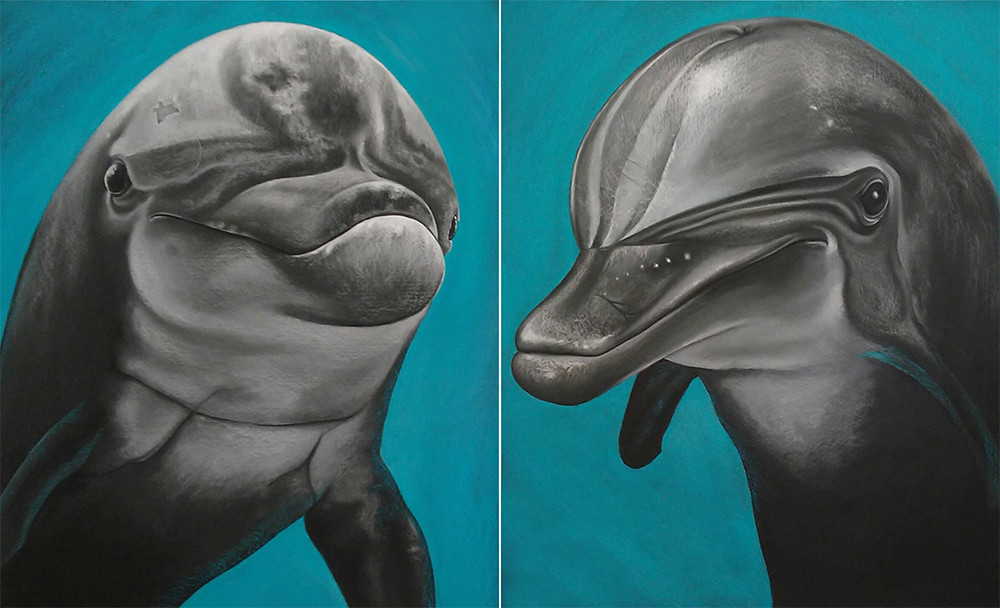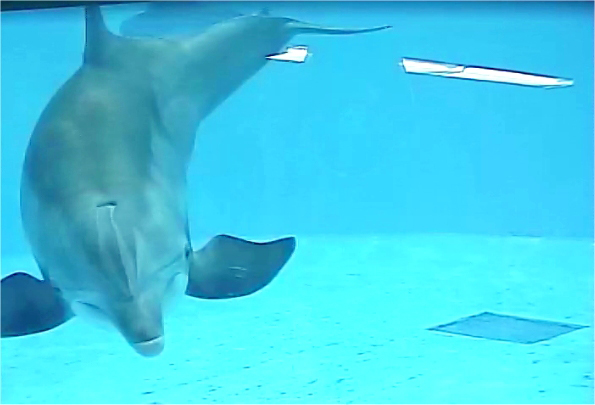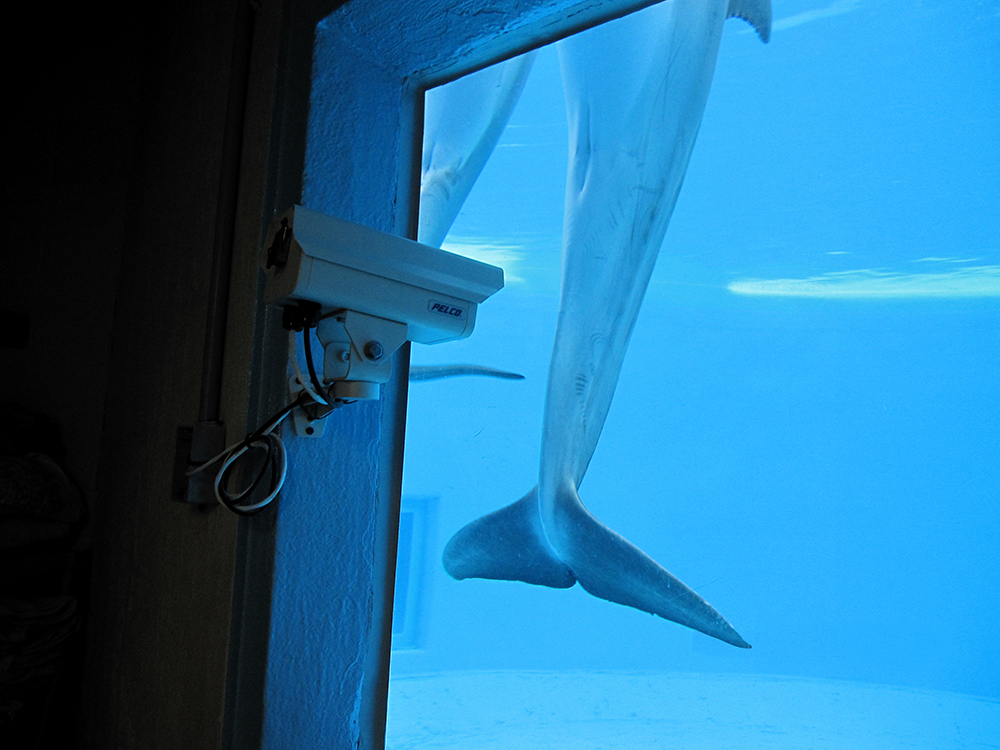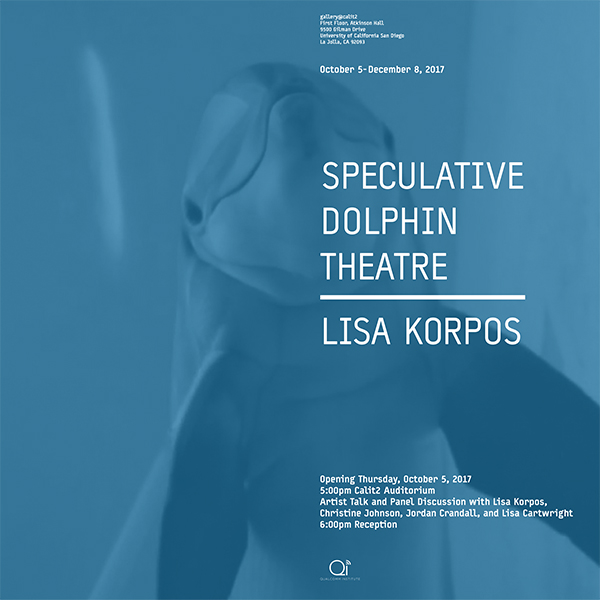Qualcomm Institute Gallery Opens Fall Exhibition Speculating on What Dolphins Are Communicating

The Fall 2017 exhibition in the Qualcomm Institute’s gallery@calit2 at UC San Diego will turn the walls of the gallery into large glass panes through which viewers can observe the underwater world of bottlenose dolphins set to a spoken-word sound track that explores how and what the dolphins communicate to each other with their chatter and body language.
The audio and video installation, Speculative Dolphin Theatre, opens on October 5 and runs through December 8, 2017 in the gallery at the entrance to Atkinson Hall. The exhibition will be open to the public, free of charge, weekdays from noon to 5pm.
The opening event on Oct. 5 will feature an artist talk, reception and panel discussion featuring artist and MFA candidate Lisa Korpos with cognitive science lecturer Christine Johnson, UC San Diego communication and visual arts professor Lisa Cartwright, and moderator Jordan Crandall, a professor of visual arts at UC San Diego.
In collaboration with UC San Diego’s Department of Cognitive Science and the university’s Dolphin Cognition Lab, the artist created the exhibition Speculative Dolphin Theatre as an immersive video and sound installation. "The installation explores dolphin communication, mimesis and nonhuman subjectivity," explains artist Lisa Korpos, a second-year MFA candidate in Visual Arts at UC San Diego. "Varying underwater perspectives of dolphins are projected on three adjoining walls of the gallery for a synchronized recreation of the real-time experience of the dolphins’ movement and activity — generating the sensation of being in the pools with them."
Fall 2017 Gallery Exhibtion
Speculative Dolphin Theatre
Dates: Thursday, October 5 - Friday, December 8, 2017
Hours: 12pm - 5pm weekdays
Location: gallery@calit2, First Floor, Atkinson Hall, UC San Diego
Gallery Opening
Speculative Dolphin Theatre
Thursday, October 5
5pm Artist talk and panel discussion in Calit2 Auditorium with Lisa Korpos, Christine Johnson, and Lisa Cartwright, moderated by Jordan Crandall
6pm Opening reception in Pre-Function Area and gallery@calit2, Atkinson Hall
RSVP to galleryinfo@calit2.net

Layered on top of the video projections are speculative, spoken-word interpretations of the dolphins’ interactions with one another, emitted through three sets of corresponding stereo audio channels. Several scripts play sequentially — each synchronized to the same looping-video segments to generate a multiplicity of potential narratives or situated perspectives on the part of the dolphins. The underwater video segments come from original recordings of seven bottlenose dolphins at the Bookfield Zoo in Chicago. In addition, the spoken-word scripts are scientifically credible. They draw on behavioral patterns discovered in the lab through multi-scalar analyses of dolphin interaction.
Adds Korpos: "The scripts are also creatively synthetic, drawing from strategies in literature and the performing arts to generate a speculative fiction based upon the enigmatic interplay of these flippered, aquatic individuals."

Glass panes and camera lenses become substrates for an exploration of a dolphin phenomenology, with concurrent views capturing the day-to-day movements and social dramas of captive bottlenose dolphins, while shifting auditory soundscapes generate a sequence of alternate, speculative realities. Videographic research footage, hydrophone recordings and parsed-out behavioral data are the work’s formative underpinnings, situating the project somewhere between the empirical, objective approaches of research and the experiential and generative aspects of the artistic process.
Korpos depicts a potential nonhuman subjectivity concerned with day-to-day, underwater social dramas through this examination of delphinid communication. She notes that the work highlights the "complexity, ambiguity and problematics intrinsic to performing observational animal research." In her lab, advisor Christine Johnson conducts moment-by-moment video and audio analyses of real-world interactions between socially-sophisticated animals to uncover behavioral patterns within these dynamic, distributed systems.

2nd-year MFA candidate Lisa Korpos uses digital media, performance, and environmental intervention to destabilize anthropocentrism. "My work explores the multiplicity of forms that sentience has taken across the animal kingdom," she notes, "along with the vulnerability we all share as embodied, corporeal creatures."
Grounded in both science and fiction, the collaborators behind Speculative Dolphin Theatre illuminate the myriad potential explanations for animal behavior that cognitive ethologists contend with as they perform their research, and the exploration is carried out through the lens of a speculative theatre that adds a literary, cross-disciplinary and performative perspective.
As a dolphin approaches the glass viewing window, she makes eye contact with the viewer -- imploring him to acknowledge her. "With this confrontation, the viewer ceases to be a passive observer," observes Korpos. "The glass screen becomes the surface where your world and the dolphin's collide, a site of spectacle, speculation, surveillance and voyeurism."
The exhibition Speculative Dolphin Theatre will remain open to the public from October 5 through December 8. The gallery@calit2 is open from noon to 5pm each weekday. RSVP requested to: galleryinfo@calit2.net.
Related Links
gallery@calit2
Qualcomm Institute
Media Contacts
Doug Ramsey, (858) 822-5825, dramsey@ucsd.edu

